Tires are like shoes for your car—they keep you moving smoothly and efficiently on the road. But have you ever noticed the cryptic markings on the sidewall of your tires? The combinations of numbers and letters such as 97t, 97s, 97q, 97h, 97v, and 97w have specific meanings and relate to a tire’s load index and speed rating. As a tire aficionado, let’s unravel this numeric jigsaw puzzle together!
What does 97 mean on a tire?
The numbers and letters on a tire indicate its load index and speed rating. The number (97 in this case) is the load index, referring to the maximum weight the tire can support when fully inflated. This would be 1609 lbs for a 97 load index.
The following letter represents the speed rating, which indicates the maximum speed the tire can maintain for a sustained period of time.
Let’s take a look at this information in a simplified table:
| Load Index & Speed Symbol | Speed Rating | Maximum Speed |
|---|---|---|
| 97T | Touring Speed | 118 mph (190 km/h) |
| 97H | High Speed | 130 mph (210 km/h) |
| 97S | Standard Speed | 112 mph (180 km/h) |
| 97V | High Speed (Performance Cars) | 149 mph (240 km/h) |
| 97W | Very High Speed (Sports Cars) | 168 mph (270 km/h) |
What does 97T mean on a tire
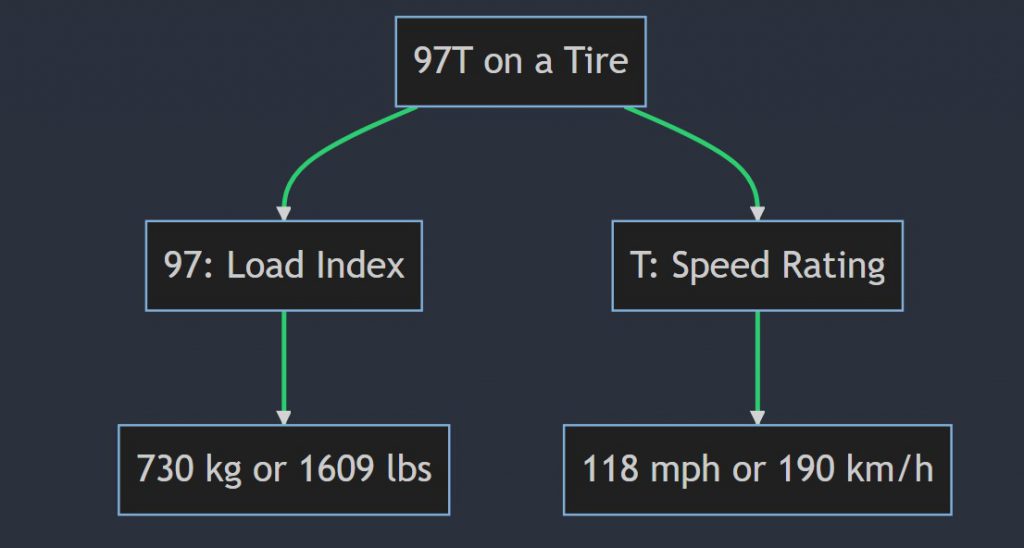
The 97T rating on a tire signifies that the tire has a load capacity of 1609 pounds and can safely sustain a maximum speed of 118 mph. So if you see 97T on your tire, rest assured, it’s not a secret code from an alien civilization, but a message about your tire’s capacity and safe speed limit.
Specifics about 97T Tires
97T tires are quite common and are designed to balance performance, safety, and economy. They are often found on passenger cars, minivans, and some light-duty pickup trucks.
Typical Use Cases for 97T Tires: 97T tires are best suited for vehicles that need good fuel economy and prefer a smooth, comfortable ride over high-speed performance. They are also typically well suited to wet weather conditions, providing good traction and stability.
Vehicles Suitable for 97T Tires
- Most passenger cars
- Minivans
- Some light-duty pickup trucks
Precautions when Using 97T Tires: While 97T tires are durable and safe, they should not be used on vehicles designed for high-speed performance or heavy-duty use. Additionally, always check your vehicle manufacturer’s specifications as using a tire with an inappropriate load index or speed rating can affect your vehicle’s handling and safety.
FAQ’s
- Can I replace a 97T tire with a higher speed-rated tire?
Yes, you can replace a 97T tire with a higher speed-rated tire, but it’s recommended that all four tires have the same rating for balanced performance and handling.
- Can 97T tires handle snowy conditions?
While they can manage light snow, for heavy snow conditions, it is always better to opt for winter or snow tires.
- Are 97T tires more expensive?
The price of a tire depends more on its brand and quality rather than its load index and speed rating. However, specialty tires (high-performance, off-road, winter) may be more expensive than standard all-season tires.
What does 97S mean on a tire
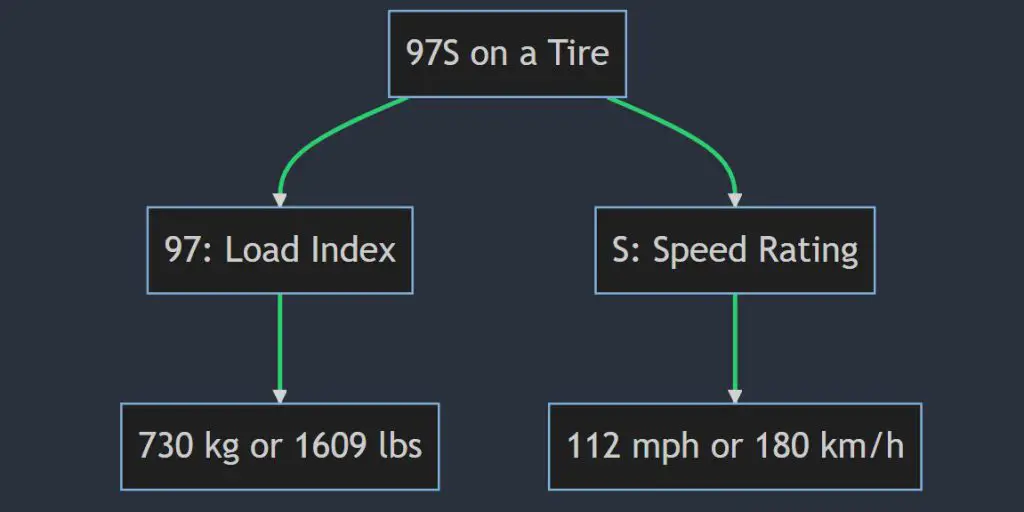
The rating 97S on a tire indicates that it can carry a load of 1609 pounds and can sustain a maximum speed of 112 mph. In the tire lingo, ‘S’ is not for ‘Super’ but a category of speed rating.
Specifics about 97S Tires
97S tires are designed for vehicles requiring modest performance and durability. This includes a wide variety of passenger vehicles from compact cars to family sedans.
Typical Use Cases for 97S Tires: These tires are typically found on cars that prioritize fuel economy and a smooth, comfortable ride rather than high-speed performance. They’re the silent workers of the tire world, reliable and efficient, like your favorite coffee maker.
Vehicles Suitable for 97S Tires
- Compact cars
- Family sedans
Precautions when Using 97S Tires: 97S tires are not suitable for high-performance or heavy-duty vehicles. And remember, tires should be replaced in sets of four to maintain balanced handling and performance.
FAQ’s
- Can I use 97S tires on a sports car?
It is not recommended as sports cars usually require higher speed rated tires for optimal performance and safety.
- What is the lifespan of a 97S tire?
The lifespan of a tire depends on several factors like driving conditions, maintenance, and quality of the tire. However, on average, tires last about 3-4 years or 12,000 to 15,000 miles per year.
- Can I replace 97S tires with 97T?
Yes, you can, but remember to replace all four tires at the same time to ensure balanced performance.
What does 97Q mean on a tire
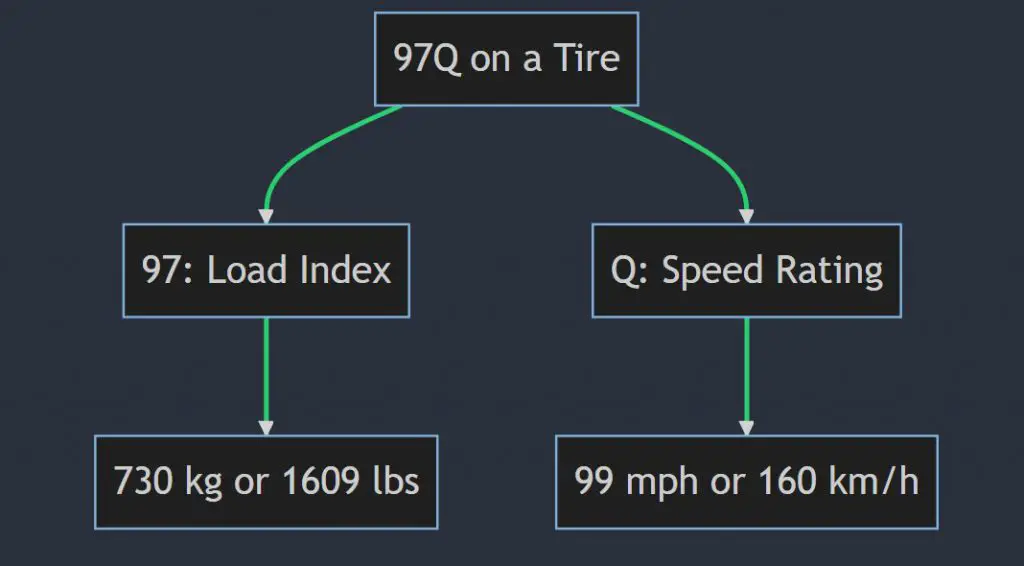
97Q on a tire indicates a load index of 1609 pounds and a speed rating of up to 100 mph. This is equivalent to the pace of a cheetah on a chill day, minus the gorgeous spots and predatory instincts, of course!
Specifics about 97Q Tires
97Q tires are typically used in winter conditions. Their lower speed rating and sturdy construction make them suitable for snowy or icy environments where control and stability are paramount.
Typical Use Cases for 97Q Tires: These tires are designed for winter conditions and are best used during colder months or in regions that experience a lot of snow or ice. They are the winter boots of the tire world—designed for traction, not for speed.
Vehicles Suitable for 97Q Tires
- Light trucks
- SUVs
- Passenger cars in winter conditions
Precautions when Using 97Q Tires: 97Q tires are not meant for high-speed performance and may not provide optimal handling in non-winter conditions. Always ensure to switch back to your regular tires when the winter season ends.
FAQ’s
- Can I use 97Q tires all year round?
While you technically could, it is not recommended as these tires are specifically designed for winter conditions. Using them in warmer weather can wear them out faster.
- Can 97Q tires handle off-road conditions?
While they can handle light off-road conditions, for heavy-duty off-roading, it is better to use specifically designed off-road tires.
- Can I replace my 97T tires with 97Q for winter?
Yes, you can. However, make sure to switch back to your regular tires once winter is over.
What does 97h mean on a tire
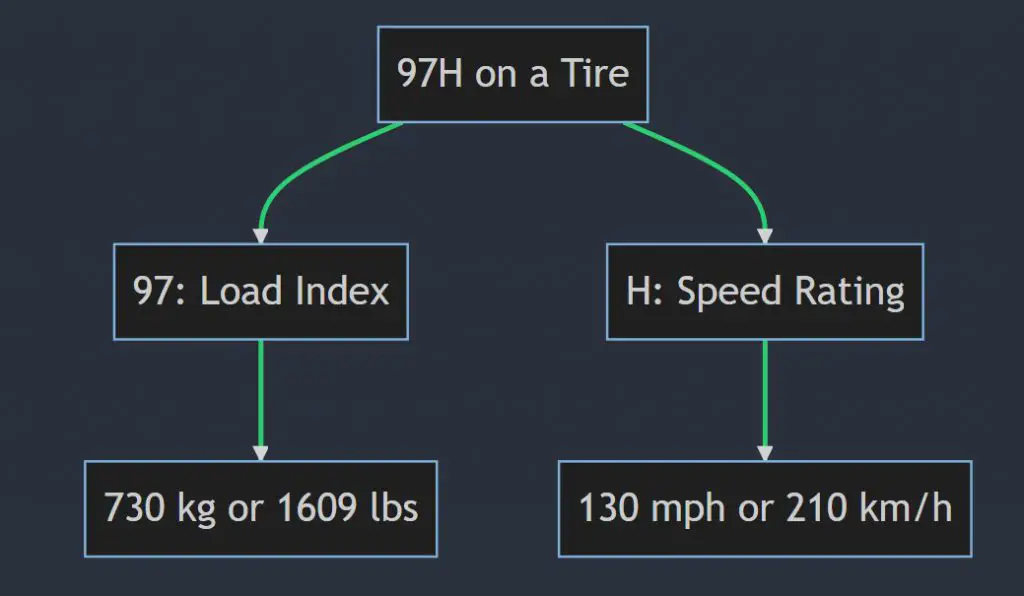
A 97H tire rating implies that the tire can carry a load of up to 1609 pounds and sustain a maximum speed of 130 mph. That’s fast, my friend! It’s like going from 0 to “Woah, slow down!” in no time.
Specifics about 97H Tires
97H tires offer a good balance between performance and comfort. They’re designed to give you good speed while ensuring a smooth and comfortable ride, making them popular choices for sedans and minivans.
Typical Use Cases for 97H Tires: These tires are great for vehicles that offer a bit of everything: comfort, performance, and safety. They’re the Goldilocks of tires—not too sporty, not too slow, just right.
Vehicles Suitable for 97H Tires
- Mid-size sedans
- Minivans
- Compact SUVs
Precautions when Using 97H Tires: While 97H tires can handle higher speeds, they’re not designed for high-performance or heavy-duty vehicles. Always adhere to your vehicle’s manufacturer-recommended speed limit and tire specifications.
FAQ’s
- Can 97H tires be used on a sports car?
While technically possible, it’s not recommended as sports cars usually require higher speed-rated tires.
- Are 97H tires suitable for off-roading?
No, 97H tires are not designed for off-road conditions. For off-roading, it’s best to use tires specifically designed for that purpose.
- What is the expected lifespan of a 97H tire?
The lifespan of a 97H tire, like any other tire, depends on various factors such as driving habits, road conditions, and tire maintenance. However, typically, you can expect them to last between 3 to 4 years with regular use.
What does 97r mean on a tire
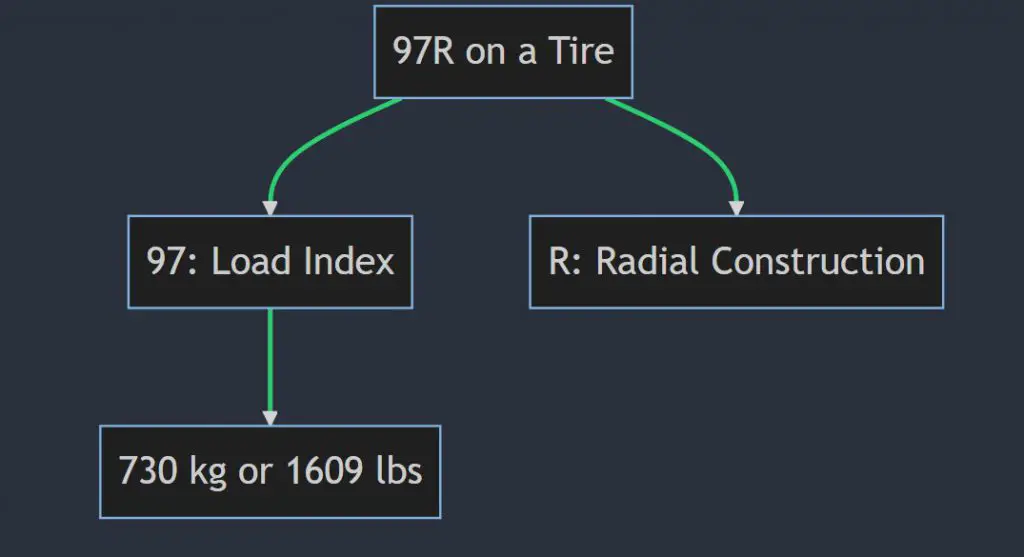
A tire with a 97R rating indicates it can safely carry a load of 1609 pounds and can maintain a maximum speed of 106 mph. In the tire world, they’re like a reliable coworker who consistently gets the job done without a fuss.
Specifics about 97R Tires
97R tires are typically seen in light trucks, vans, and SUVs. They are designed for durability and can handle heavier loads, making them suitable for commercial or off-road use.
Typical Use Cases for 97R Tires: These tires are great for vehicles that carry heavy loads or go off-roading. They are like the Hercules of tires—strong and reliable.
Vehicles Suitable for 97R Tires
- Light trucks
- Vans
- SUVs
Precautions when Using 97R Tires: Ensure your vehicle’s maximum load and speed limits align with the 97R tire’s specifications. Exceeding these limits can lead to tire failure and potential accidents.
FAQ’s
- Can I use 97R tires on a sedan?
While you technically can, it is generally not recommended as these tires are designed for heavier vehicles.
- Are 97R tires suitable for off-roading?
Yes, 97R tires can handle light to moderate off-road conditions. However, for extreme off-roading, it’s best to use tires specifically designed for that purpose.
- What’s the difference between 97H and 97R tires?
While both tires can carry the same load, 97H tires have a higher speed rating (130 mph) compared to 97R tires (106 mph). Also, 97H tires are typically used on sedans and minivans, while 97R tires are more common on light trucks and SUVs.
What does 97v mean on a tire
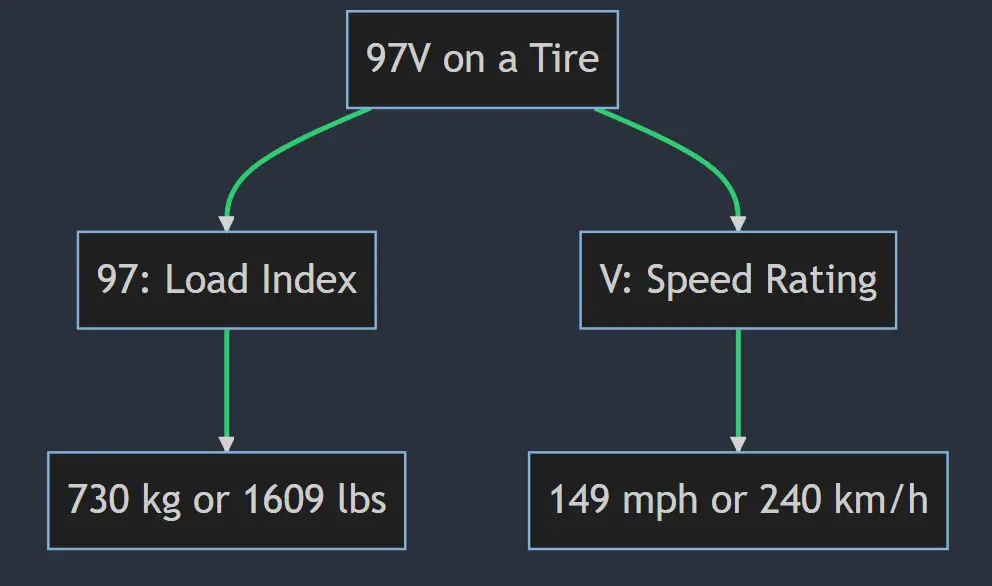
A 97V tire indicates that it can safely carry a load of 1609 pounds while maintaining a maximum speed of 149 mph. These are your performance tires, the kind that make your car feel like it has wings!
Specifics about 97V Tires
97V tires are high-performance tires typically used on sports cars and high-end sedans. They are designed for speed, handling, and responsiveness.
Typical Use Cases for 97V Tires: If you’re a speed enthusiast with a need for performance, 97V tires might just be your best friends. These are designed for high-speed driving, offering excellent handling and responsiveness.
Vehicles Suitable for 97V Tires
- Sports cars
- High-end sedans
Precautions when Using 97V Tires: While 97V tires offer excellent performance, they should only be used on vehicles designed to handle such speeds. Always follow your vehicle manufacturer’s tire recommendations.
FAQ’s
- Can I use 97V tires on a regular car?
While you can, it’s usually not necessary unless the vehicle is used for high-speed driving. These tires can be more expensive and may wear out faster than regular tires under normal driving conditions.
- What is the lifespan of a 97V tire?
The lifespan of a 97V tire can be shorter than regular tires due to the demands of high-speed driving. However, with proper care and maintenance, they can still last a reasonable amount of time.
- Can I replace a 97H tire with a 97V?
Yes, you can, but remember to replace all four tires at the same time to ensure balanced handling and performance.
What does 97w mean on a tire
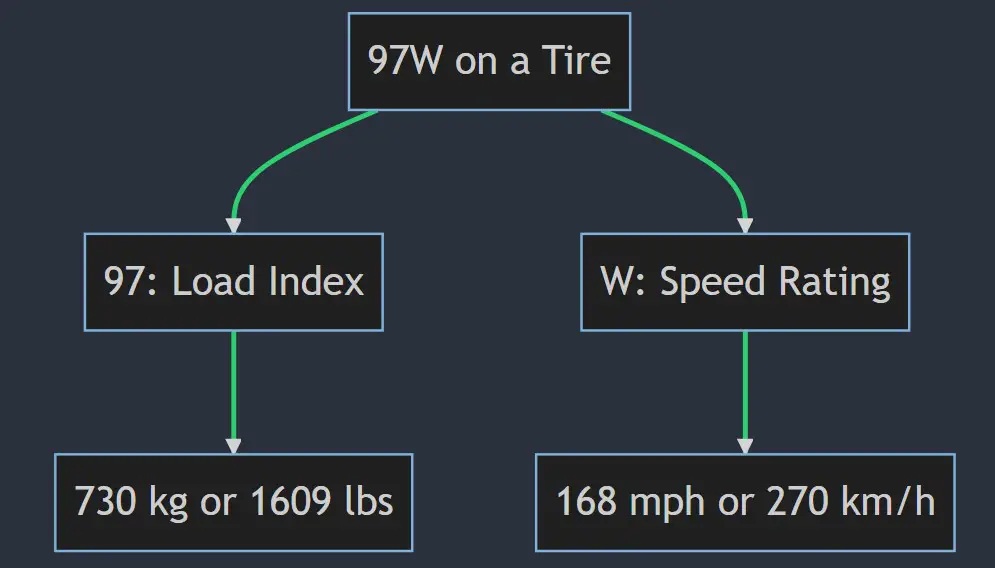
A tire with a 97W rating indicates it can safely carry a load of 1609 pounds and can maintain a maximum speed of 168 mph. These are your ultra high-performance tires, delivering exceptional handling and responsiveness at high speeds.
Specifics about 97W Tires
97W tires are used on high-performance sports cars and luxury vehicles. They offer exceptional handling, speed, and responsiveness, but can also be more expensive and may wear out faster than standard tires.
Typical Use Cases for 97W Tires: 97W tires are designed for drivers who demand high performance and speed from their vehicles. They’re like the Formula 1 drivers of the tire world—built for speed, precision, and control.
Vehicles Suitable for 97W Tires
- High-performance sports cars
- Luxury vehicles
Precautions when Using 97W Tires: While these tires offer exceptional performance, they should only be used on vehicles designed for high speeds. Always follow the tire recommendations of your vehicle’s manufacturer.
FAQ’s
- Can I use 97W tires on a regular car?
While technically possible, it’s not recommended unless the vehicle is used for high-speed driving. These tires are more expensive and may wear out faster under normal driving conditions.
- What is the expected lifespan of a 97W tire?
The lifespan of a 97W tire can be shorter than regular tires due to the demands of high-speed driving. However, with proper care and maintenance, they can still last a reasonable amount of time.
- Can I replace a 97H tire with a 97W?
Yes, you can, but remember to replace all four tires at the same time to ensure balanced handling and performance.
Recap And Summary
So, there you have it, folks. We’ve just taken a joy ride through the fascinating world of tire ratings. Whether you’re rolling with a 97T, flying with a 97W, or cruising with a 97H, remember this: the key to a smooth ride is understanding what those little numbers and letters mean.
FAQs
- What does 97w xl mean on a tire?
The ’97W’ indicates that the tire can carry a load of up to 1609 lbs at a maximum speed of 168 mph. The ‘XL’ stands for Extra Load, meaning the tire can carry more load than a standard tire of the same size.
- 97w vs 97y
Both 97W and 97Y tires can carry the same load (1609 lbs). The difference lies in the speed rating. While the 97W can handle speeds up to 168 mph, the 97Y takes it up a notch and can handle speeds up to 186 mph.
- 97t vs 97h
Both 97T and 97H can carry the same load, but the 97H can handle higher speeds (130 mph) compared to the 97T (118 mph).
- 97s vs 97r
Once again, both the 97S and 97R can handle the same load. The 97S has a maximum speed of 112 mph, while the 97R can go up to 106 mph.
Final Verdict
Remember, folks, your tire is the only thing between you and the road. Treat them well, and they’ll return the favor. So, the next time you’re out shopping for new tires, impress the salesperson with your newfound tire knowledge. Go on, be the tire guru you were always meant to be! Happy driving!
Alternative Tire Size Codes of Similar Specifications

AR Jeet has been a tire mechanic for over 2years. He has worked on all types of vehicles, from cars and trucks to RVs and ATVs and motorcycles. He has seen it all when it comes to tires, and he knows how to fix them.
AR Jeet is a tire expert, and he is passionate about his work. He loves to help people keep their vehicles running smoothly, and he is always happy to answer any questions that people have about their tires.
If you need help with your tires, or if you just want to learn more about them, then AR Jeet is the man to talk to. He will be happy to help you out, and he will make sure that you get the best possible solution.
He has a blog [Tirespick.com] where he writes about all things tire-related, and he is always happy to help people with their tire needs. Know more about AR Jeet.

